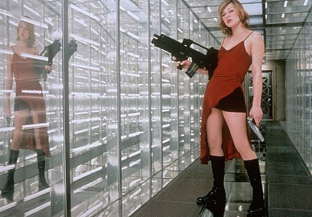|
|
What Went Right: Resident Evil Part IBy Shalimar SahotaSeptember 11, 2012
By the time the first film was released in March 2002, with the exception of a few spin-offs, there were four canonical Resident Evil games that had been released; Resident Evil, Resident Evil 2, Resident Evil 3: Nemesis and Resident Evil Code Veronica. They had sold a combined total of 16 million copies worldwide. Whereas other videogame based movies have fallen by the wayside (though Mortal Kombat and Tomb Raider do currently have a reboot in the works), one of the reasons that Resident Evil lends itself so well to a big screen adaptation is largely because the games themselves were inspired by movies. They’re essentially the gaming equivalent of B-movies. The first Resident Evil film was greenlit in 1999, with a significant amount of its budget coming from Constantin Film, headed by producer Bernd Eichinger. Capcom had some say into what was in the film, but no real control. Given the game’s roots, who better to write and direct the film than George A. Romero? His script revolved around the mansion incident from the first game, with Chris Redfield and Jill Valentine as lead characters. However, according to Romero, Eichinger was not keen on his script, and after a couple of drafts, he was fired from the project. It also turned out that Romero based his script on watching a video playthrough of the first game. Eichinger then brought in Paul W.S. Anderson. He had adapted the Mortal Kombat videogame into a hit back in 1995. He also revealed that he grew up watching the movies that influenced the games, and that he had played through all the Resident Evil games. He wrote, directed and produced the film through his production company Impact Pictures, along with his producing partner Jeremy Bolt.
[ View other columns by Shalimar Sahota ]
[ View other What Went Right columns ]
[ Email this column ]
|

|
|
|

|
Friday, November 1, 2024
© 2024 Box Office Prophets, a division of One Of Us, Inc.


